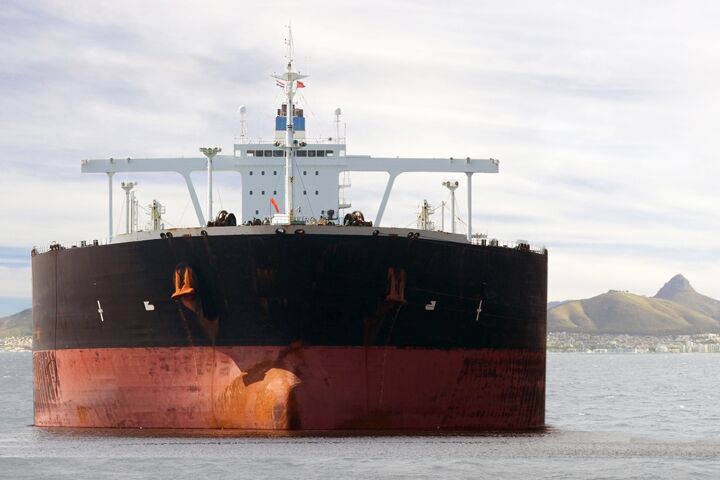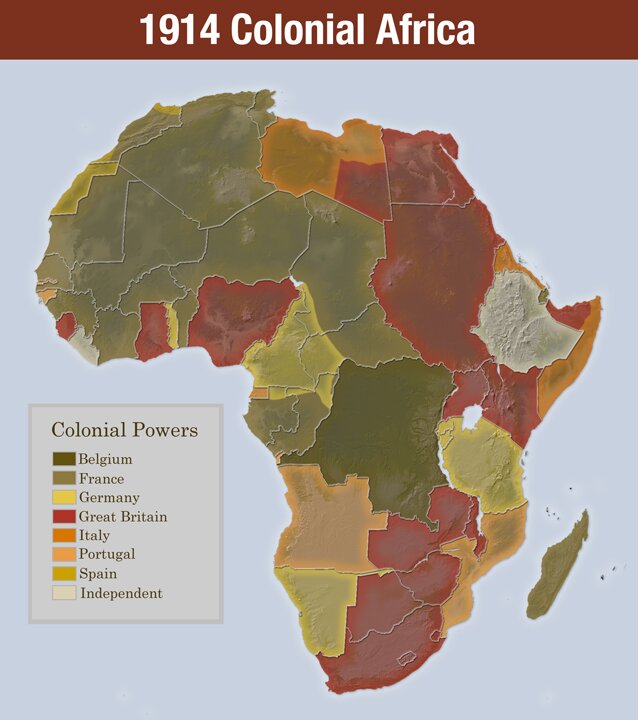
The Treasure Tankers of Africa
A bright South Atlantic sky. Deep blue African coastal waters. A low, powerful, omnipresent rumble. The waters agitate, then divide into white furrows as the prow of a gigantic vessel plows the ocean off Lagos.
The monolithic hull, 166 feet wide and more than 60 feet high, displaces 77 Olympic swimming pools of seawater every ship-length it travels. At 987 feet long, this $100 million leviathan could easily carry the Eiffel Tower laying down on the pipe-festooned prairie that is its deck. The gleaming white superstructure, six stories above the waterline, momentarily eclipses the sun, before allowing it to reemerge over a fluttering flag at the stern and a frothing, surging wake.
All of this to do one thing: Transport 200,000 tons of African oil.
More than 4,000 of these Goliaths cruise the oceans’ superhighways, carrying billions of tons and trillions of dollars’ worth of oil, coal, tin, iron, uranium, nickel and platinum away from Africa’s ports to fuel the global economy.
Where are they going?
The Past
Stuffed African treasure boats sailing for Europe is nothing new. One of the earliest instances of African colonization occurred back when northern Africa was known not as an oilfield but as the “granary of the world,” a land of lush forests, rich soil and exotic animals. Then, Rome came. In the wake of Rome, northern Africa became imperial Roman detritus.
In the 1800s, Africa again became a frontier for European colonization. France, Belgium, Spain, Italy and Portugal each took a slice of the African continent, the contents of which were ferried away to help industrialize Europe. Otto von Bismarck’s Germany secured the third-largest African empire, covering 1 million square miles in Togoland, the Cameroons, Taganyika and Namibia—a sore spot, since German colonial tactics there included genocide.
Britain, however, dominated the African and global colonial scene with an unmatched navy, secure trade routes, comparatively masterful administration and comparatively minimal brute force. But Berlin’s master plan called for a German Mittel-Afrika empire that could contest Britain’s position in Africa and beyond.
Then came World War i. Kaiser Wilhelm’s aggressive foreign policy backfired. The supply ships continued to sail under the benign rule of Pax Britannia.
Then came Adolf Hitler. But Germany lost again, and now the gun smoke cleared over a new age: Pax Americana.

During the high-water mark for American and British greatness, billions of tons of raw materials floated from Africa and other nations to the United States and the United Kingdom. These nations also mined 150 percent more coal than the rest of the world, manufactured 75 percent of the world’s steel, and possessed 80 percent of world aluminum, 75 percent of zinc, 66 percent of rubber, and dominated chromite, copper, lead, tin and bauxite production. They owned most of the gold in the world and produced 60 percent of the world’s petroleum, not including vast foreign investments.
But Germany was not done—in Europe or in Africa, or the rest of the world for that matter. A 1951 Nazi document reveals that Germany was then already preparing for round three of Germany as master and Africa as storehouse.
“For its industrial development, Germany requires—much more than in the past—raw materials, sources of energy and a market with strong purchasing power. All this it can attain only in a unified Europe and through the simultaneous development of Africa in a common European undertaking,” the Plain Truth magazine wrote back in May 1961.
The Present
Today, Africa is a continent brimming with poverty, disease, starvation, crime, corruption, war, misery—and diamonds, uranium, manganese, chromium, nickel, bauxite, cobalt, platinum and gold. Crisis-riddled Africa’s tankerfuls of natural resources are up for grabs. Africa also contains 100 billion barrels of black gold—8 percent of the world’s proven oil reserves.
Empires need oil.
Meanwhile, America and Britain’s lead in controlling world resources is sinking. British colonies are, literally, history. America is officially in recession. Oil production and mining, not to mention manufacturing and shipbuilding, are now riding low in the water or submerged altogether. And the crucial sea gates once controlled by London and Washington—Panama, Suez, Hong Kong, Singapore, Malta, South Africa—have almost all fallen into enemy or independent hands.
Meanwhile, China has become Africa’s newest and most enthusiastic colonizer, with wave after surging wave of investments, capital infusions, construction projects and bilateral agreements doubling Sino-African trade year after year after year and making cash-rich China Africa’s third-most important trading partner.
Germany’s would-be quarry also holds 30 percent of world mineral reserves, producing over 60 metal and mineral products. One of the world’s largest economies and its greatest exporter, Germany is stringing together a chain of diplomatic and business initiatives designed to finally turn its African foothold into a wide-open garage door.
Germany has 39 bilateral investment treaties with Africa, by far the most of any European country. German industries already rely heavily on African resources, and Berlin has already stretched its tentacles of influence south through the Balkans and Malta into Africa—not with rampaging Wehrmacht troops, but via a subtler Afrika Korps, smoke-screened by an EU shroud and based on diplomacy and trade. Using “corporate colonization,” Germany stepped up its penetration of South African markets in 1999, and held the first Africa-Europe summit in 2000, producing an action plan for economic, human rights, terrorism, health, education and environment issues—and industrial development of African resources. The same year, former European Commission President Romano Prodi revealed Europe’s intentions: “The plight of Africa is essentially Europe’s problem, not that of the U.S. or other powers, because of past links and proximity ….” Europe and Africa have “deep roots,” he said, “and we should return to them” (Financial Times, April 4, 2000). In October 2005, the European Commission advanced Europe’s vision for Africa further with its “EU Strategy for Africa,” which defined a framework for a strategic partnership for security and development between the EU and Africa. A year later, Brussels held the first EU-Africa business forum.
At the same time, the European Commission challenged China on its African investments. That threat, though subtle, was not empty. Berlin and Beijing are at odds in Nigeria, Angola, Sudan and Congo, and both have big ambitions for Africa as a whole. For its part, the EU provides Africa with billions of euros of aid each year, more than it receives from any other source.
Last year, the corporate Afrika Korps’ energy and engineering juggernauts, including Siemens and Ruhrgas, secured a strategic partnership with Nigeria—an important source of coal, tin, iron ore, lead, zinc, limestone and niobium, as well as oil, Nigeria being the world’s eighth-largest oil exporter, and possessor of the world’s 10th-largest proven oil reserves. Just last month, German President Horst Köhler added his weight to the German-African Forum in Abuja to help lock in Nigeria as a German port of call.
The grand EU/Africa strategic framework includes an agreement to enhance electricity and gas pipeline interconnections between African countries and between Africa and the EU—worth €1 billion over two years—plus a whole barrelful of other development and security initiatives. “Development” ultimately means African treasure boats charting their courses for Europe. “Security” ultimately means providing the firepower necessary to keep it that way.
To that end, Germany has not shied away from breaking out its military from World War ii mothballs. The Bundeswehr engaged in African missions in 1994, 2002 and 2006, and is currently participating in naval patrols off the Horn of Africa.
This is in addition to Germany’s behind-the-scenes puppeteering in Ghana, Sudan, Rwanda (where it has signed four financial cooperation pacts so far this year) and the Democratic Republic of the Congo—which is currently engaged in what is perhaps the bloodiest, nastiest humanitarian crisis in the entire world. Germany is also looking to “return to its roots” in Namibia, home to the strategic deep-water port of Walvis Bay.
Another interesting note about all these corporate and military deployments: There have been almost zero German withdrawals.
The Future
What happens next? Today’s rising empires need treasure. Who will get Africa’s? Who will control the people of that continent?
Will it be cash-rich China, who willingly overlooks human rights abuses, of which there are many in Africa? Could it be America? Or maybe a combination of nations? Anybody, it seems, could get Africa’s treasure boats.
But this is who will: Germany.
Germany will become the master of Africa, extracting billions of tons of natural wealth to construct and fuel a gigantic, jaw-dropping, world-dominating empire. Its current economic and political woes are preparing the way for a Bismarck-style strongman to grab the helm in Berlin and revolutionize Germany once again into a strong, unified, aggressive world power that, among other things, consumes Africa by the boatload.
But the headlines cited above are far from conclusive. By themselves, they don’t automatically mean Germany will conquer Africa. So how can you know?
Daniel 8 describes symbols of a modern empire that extends south and east toward Jerusalem (verse 9). You can find additional information about this same empire in Ezekiel 27, which discusses its imperial trade connections. Verse 15 refers to Dedan, the forerunner and denotation of Africa, which is a place endowed with both ivory and ebony—among other natural resources.
But Revelation 18 affords the most detailed description of this imperial “king of the north.” Today’s African headlines report German business behemoths on a corporate colonization blitzkrieg. The Bible is not silent about these merchants. Verse 3 introduces “the merchants of the earth,” the corporate boiler room that will help drive this ship of church and state to political and religious dominance over “all nations.” Verses 12-19 describe in detail the level of wealth this future empire will acquire in the same way that the Nazis reaped payloads of gold, silver, precious metals, brass, iron, flour, wheat, livestock, slaves and “souls of men.”
But this is merely the short-term future. Beyond the next few years in prophecy, a new revolution will sweep Africa, Germany and the whole world. Under this new world system, the world’s abundant resources will no longer be swindled, stolen or covered in blood. The dishonest and selfish nature that all nations and all people have will be replaced with an outgoing concern for others. To read about this happy and abundant world, read The Wonderful World Tomorrow—What It Will Be Like.
